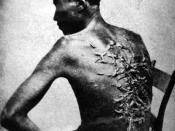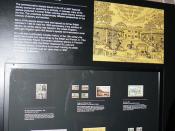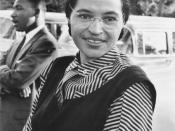There are many aspects of the early African American oral traditions that can help us understand the literature that is later published concerning the struggle the slaves faced. The proverbs, folk cries, work songs, spirituals, and folk tales give us a better understanding of the literature that is later developed. The oratory from this period helps us understand the religion, culture, and style of African Americans and the literature they have developed as slaves and freemen.
The oral work shows us the religious beliefs of the slaves. It shows both the native African beliefs in addition to the Christian beliefs that were pressed on them by their masters. The slaves used folk cries like the "Ring Shout" to communicate with the god's in a traditional African way and used songs to compare their struggle to that of biblical Moses. For later writers, the early spoken word was one of the few ways they could learn of the faith of their family who were taken from Africa and their ancestors who were left there.
The oratory of the slaves shows both the culture of their current situation and that of their African heritage. Many folk tales and proverbs were taken Africa and modified to fit the environment of the United States. An African proverb says that, "When a dog is hungry, it eats mud" (29). The Americanized version of the proverb says, "A scornful dog will eat dirty pudding" (29). Many aspects of African culture were brought over with the first generation slaves, and continued to be passed on and modified to fit the culture of enslavement in a foreign land. Because of the nature of Slavery, the few slaves who knew how to write did not have much of a chance to save anything they wrote down. The slave owners,



The Influence of African American Oratory on Later Literature,
I thought this was a pretty good essay. Just a bit vague about the distinct voice patterns. Still, pretty good!
4 out of 5 people found this comment useful.